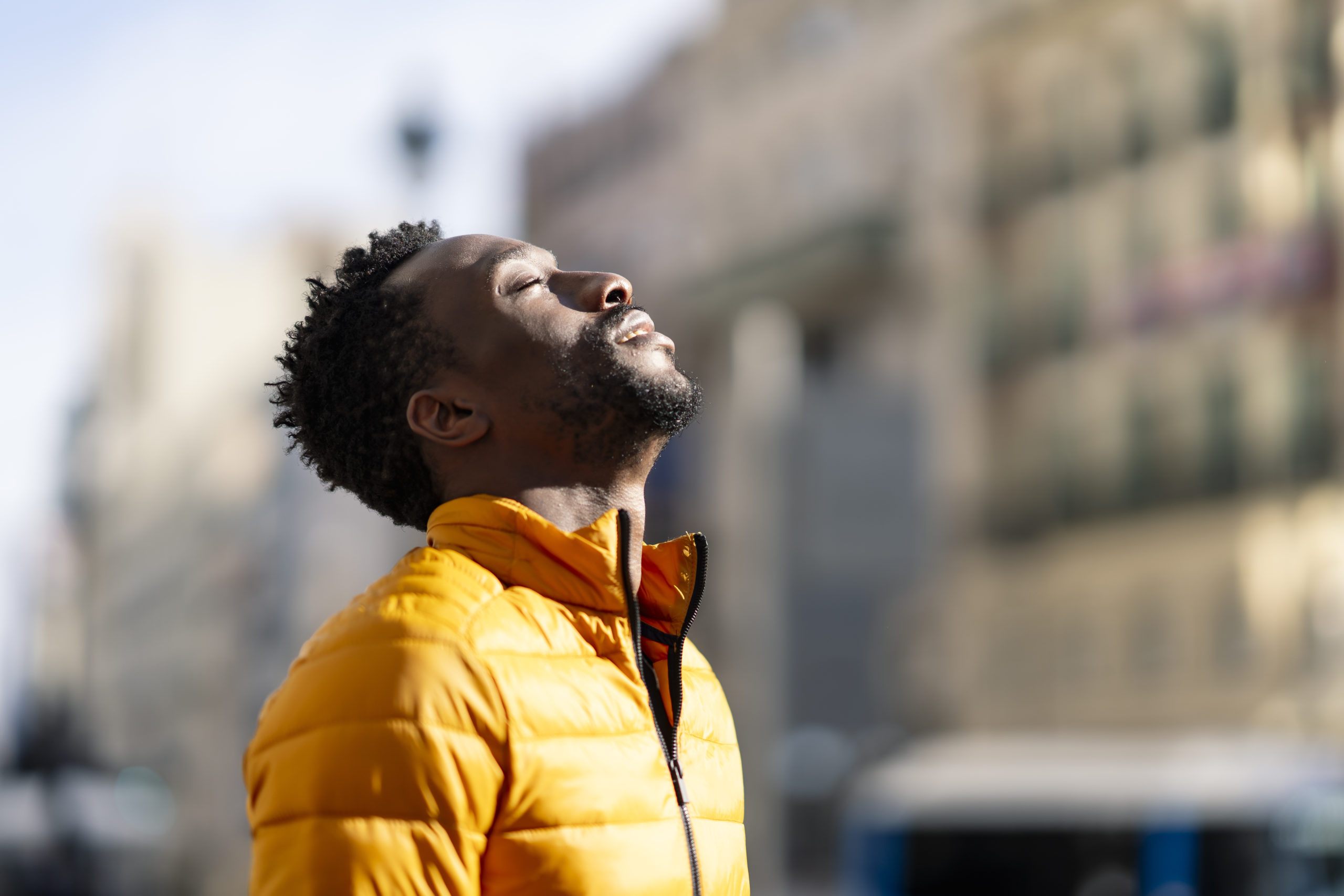Once in a while, during a typical hectic day in our household, my wife will turn to me wearing a pretend-astonished smile and say: “Chris, did you know that we have three boys?” Although it seems like she’s just playfully stating the obvious, I hear her words like the ringing of a generations-old mission bell, a reminder of what’s most important to me. Each time, I’m struck by the responsibility of raising our boys in an era when masculinity, in the way that it’s long been defined, is being called to expand.
Growing up, I was taught that traditional male attributes are things like toughness, emotional reserve, strength, power, and staunch individualism. This image of a “traditional man” feeds into once-clear-cut roles like winner and provider. Edward M. Adams and Ed Frauenheim suggest that this version of masculinity is confined: both limited and limiting. In their 2020 book, Reinventing Masculinity, Adams and Frauenheim write, “Confined masculinity focuses more on a man’s sense of separateness rather than his sense of belonging. For example, many believe they should keep their emotions to themselves, be self-sufficient and show no vulnerability.” By accepting that these qualities are somehow inherent to masculinity, and essential for success as defined by our cultural power structures, we create the space for a society that frequently and casually pardons even abusive behaviors from men. “The phrase ‘boys will be boys’ is designed to make us think that boys are naturally more aggressive and competitive and less emotional, empathic, or in need of close same-sex friendships than girls,” says Niobe Way, professor of developmental psychology and the founder of the Project for the Advancement of Our Common Humanity at New York University. She notes that frequently used phrases like “boys will be boys” or “no homo” (a phrase frequently used by straight men to emphasize their sexual orientation when making what might seem like emotional or vulnerable comments) perpetuate the idea that the human need for close, caring relationships have a sex (female) and a sexuality (gay), and thus are discouraged for those who are neither. “The problem is not the nature of boys, but the culture in which they, and we, live,” Way says.
I was conditioned to keep quiet about my inner strife. And I’m not alone.
The patterns of the confined-masculine stereotype have caused me to reject parts of myself—of my own vulnerability—inflicting deep wounds. I was conditioned to keep quiet about my inner strife. And I’m not alone. Research from the National Institute of Mental Health (NIMH) found that about six million American men suffer from depression every year. And they’ve been documenting how the traditional male role, “which restricts emotional expression and encourages a preoccupation with success, power, and competition,” is associated with negative physical and psychological consequences, such as depression, anxiety, and relationship problems. Men are less likely to receive treatment for mental illness, and in the US, men are 3.5 times more likely to die by suicide than women. This disconnection from our emotional lives can be isolating. It contributes to men having a higher rate of alcohol abuse—and being about two times more likely to misuse other drugs—than women. And it’s a sobering metaphor for how confined masculinity plays out that men represent 93% of the people in prison.
Ashanti Branch, founder of The Ever Forward Club, says, “The problem is either that a high percentage of men are bad—or it’s that the things we’re teaching our boys become the reasons why, once they grow up, they can’t live among the free.” Branch’s Million Mask Movement encourages young men to embrace who they are, and let people see more than the “mask” they believe is safe to show the world. It has served me (and I believe it would serve all of us) to find an expansive understanding of masculinity, by first grieving the ways in which we’ve been harmed by confined masculinity.
Freeing Ourselves Through Mindfulness
Bringing healing to masculinity is not a men-only project, but I believe it can be led by men willing to engage in the process with a sense of hope, generativity, and “beginner’s mind”—an attitude of openness, willingness, and nonjudgment that is nurtured through meditation and mindfulness practices. For me, this awareness dawned 20 years ago when I was given mindfulness teacher Thich Nhat Hanh’s book The Miracle of Mindfulness as a gift. In the first chapter, he tells a story about a father named Allen, who is able to reframe his loss of personal time (as a result of having a family) through cultivating a beginner’s mind. Allen learns to shift from a poverty mindset, where self-reliance and separateness prevail, to a mindset of abundance, collaboration, and connectedness. This story opened me to new ways of seeing my embodiment of masculinity: I remember noticing that the metaphorical “man cave” I inhabited suddenly seemed brighter, more spacious, and more nuanced with color. I no longer felt like an abandoned prisoner in that cave. Instead, I could see myself as an empowered creator of my own life, within a community of care.
Soon after receiving this book, I met my best friend, Rob. It didn’t take long for his extraordinary style of putting his heart first to dismantle the “tough man” stereotype I had built my life around. Since our early days of friendship, Rob’s ended every one of our times together by saying “I love you.” He not only says it, he means it, and he’s backed it up with years of steadfast loyalty to our friendship. His kindness and brave vulnerability allowed me to see (and emerge from) that man cave I had confined myself to.
Perhaps the most liberating moment of my friendship with Rob came when we were both pursuing our master’s degrees in transpersonal psychology. During a class, Rob and I (already having forged a strong friendship) volunteered to offer a therapeutic “working” to the class—a teaching tool where, typically, one person acts as therapist and another acts as client, in a “fishbowl” situation. I took on the client role, with Rob as the therapist. Rather unexpectedly, though, this quickly put me in contact with a deep inner wound I carried: the pain and distrust accumulated from all the times I’d felt hurt and betrayed by other men.
Standing metaphorically naked in front of my classmates, I uncovered a place of deep mistrust and profound despair. My instinct was to push Rob away, as I had done with other untrustworthy men in my life. My body trembling, I forcefully told Rob, “Go away!” And when that had no effect, my defenses bristling, I bellowed in shame, “Get the fuck out of here, now!” All I wanted was to return to my cave, to get away, triggering my deep-seated impulse to swallow the pain, to avoid vulnerability at all cost, to push on alone like a soldier.
But Rob just sat there. Looking into my eyes, with disarming compassion, his face beamed the words I’m here, Chris, and I’m staying.
His kind presence, full of empathy and accountability, finally broke through my defenses. When I realized the repetition of this painful pattern, and that there was nothing I could do to make Rob leave, I surrendered to the unrelenting wave of grief that overcame me. And yet I knew, in that moment, that a new light was dawning.
Discovering such a genuine relationship after decades of pushing them away was, for me, the most painful aspect of growing beyond my confined masculinity. The masculine status quo trained me to not exhibit signs of caring—or even, really, to care deeply. For much of my life, I had risked very little emotionally in relationships with men, in order to preserve the hardened indifference of the view of masculinity I inherited. I know I’m not alone in grieving this loss. Yet, Rob’s unconditional acceptance of me in my wounded state allowed me to see my tears not as “weakness,” but as my own emerging strength.
Learning to Embrace Vulnerability
With the newfound spaciousness of a beginner’s mind approach, and the experience of deep friendship, I became committed to working with the pain and suffering of confined masculinity. Decades later, and now as a father of three boys, I find plenty of opportunities to engage this mission. One such moment arose last winter as I was leading home a pack of face-masked boys (my sons and two of their friends), in subfreezing temperatures, on a bike ride from the local park.
Two minutes into the ride, my youngest boy, Kienan, stopped and cried out for me, “Poppa, poppa, my legs hurt!” Unthinkingly, I yelled back, “We’re almost home; you need to keep pushing it!” With a judgment so immediate I missed it, I pedaled harder, prioritizing the victory of getting home (out of the cold) over attending to Kienan’s need. Denying his perceived “weakness” was counterproductive, though, as his cries grew louder: “Poppa, Poppa, it hurts! I can’t do it anymore.” My son’s predicament, finding himself up against his own limitations, activated my own fear of inadequacy. And, as often happens from a state of fear and denial, I nearly turned to anger.
Thankfully, before a string of expletives could escape my mouth, my mindfulness practice helped me pause. Years of practice tapping into compassionate awareness helped me recognize that I needed to stop, or else risk damaging Kienan’s relationship to his own vulnerability. So, with my own fire of inadequacy still burning in my body, I turned around, got off my bike, faced him, and got curious about his condition.
It turned out Kienan’s legs were so cold they were literally “freezing up” and he did not have the strength to push his fixed-gear bicycle up the hill. He was deeply afraid of being left behind. When I finally got this at the emotional level, I was able to shift from trying to override his vulnerability (and my own anger) to supporting him with patience and love.
When I choose to care, in the face of my old wariness, anger, and grief, I can see an evolutionary unwinding taking place.
“Kienan, what will help you to get home safely?” I asked. Over the next few minutes, we collaborated with the other boys to find a way for him to make it home. One of the older boys offered Kienan his scooter, knowing it would be easier to propel up the hill. Kienan accepted, and within moments his tears had dried and a glow of confidence returned to his beautiful face. All he had needed was for his struggle to be validated and included within the community of boys. My irritability transformed into deep gratification.
Later that evening, while at the dinner table, our family reviewed the events of the bike trip. Kienan was still noticeably tender from the episode. His brothers pounced with put-downs and harsh critiques of his “inability” to complete the ride. This reached its apex with my oldest son firing the long-standing admonishment, “You don’t need to cry about it!” I recognized, once again, that the “tough” masculine motif had already affected my boys.
Instead of losing it, I paused, intentionally dropping into a space of nonjudgmental awareness. From this space, I said to them, “Crying actually signals masculine character and strength.” I reinforced the point by reminding my older boys of recent moments in which they, too, had found themselves in tears. It was this kind of seeing that finally opened the path to understanding—an opening, at least, to shine a light of truth on all the programming they receive from a culture steeped in confined masculine stereotypes. My oldest apologized, and we all shared a moment of collective softening.
Choosing Wholeness
I was so close that day to shutting down my son’s vulnerability. In my childhood, even the slightest sign of vulnerability meant risking censure and rejection, so I learned that I had to “be strong” if I wanted to belong—even if both the strength and the belonging were fragile, built on limiting and untrue notions. When I choose to care, in the face of my old wariness, anger, and grief, I can see an evolutionary unwinding taking place, as it did with Kienan. We must ensure that this keeps happening so our boys know they can choose how they want to be in the world.
For me, mindfulness practice has been the net that catches me before I’m jettisoned into the rabbit hole of denial. It has shortened how long I spend swept up in these old patterns and supplied me with critical strength to charge a new path forward—one that heals by validating and honoring vulnerability. It’s painful to see and wholeheartedly feel the damage inflicted by confined masculinity. But in doing so, there’s an opportunity to redefine masculine strength, to let it encompass our inner struggles, our fears, our loves. We get to choose to change the story by putting our vulnerability first. This is masculinity’s most dignified birthright, and it’s the kind of victory we’ve been waiting for.
read more
How Mindfulness Helps to Liberate Masculinity
A conversation about empowering men through a courageously expansive (and compassionate) vision of what it means to be a man.
Read More
How to Rest in Awareness by Tapping into a Mindful Moment
Mindfulness teacher Jason Gant reflects on a heartfelt memory when he was able to lean on his deep practice and mindfully take action.
Read More
How to Practice Listening Without Getting Defensive
Taking the time to listen to how another person feels—without immediately and sometimes impulsively reacting—creates the space for both parties to feel heard. Try this exercise to strengthen your active listening skills.
Read More
Why Self-Compassion is Essential to Healing
There’s nothing wrong with us when we feel strong emotions like irritability or anger, in fact, says Tara Brach, they are primitive forms of self-love.
Read More





